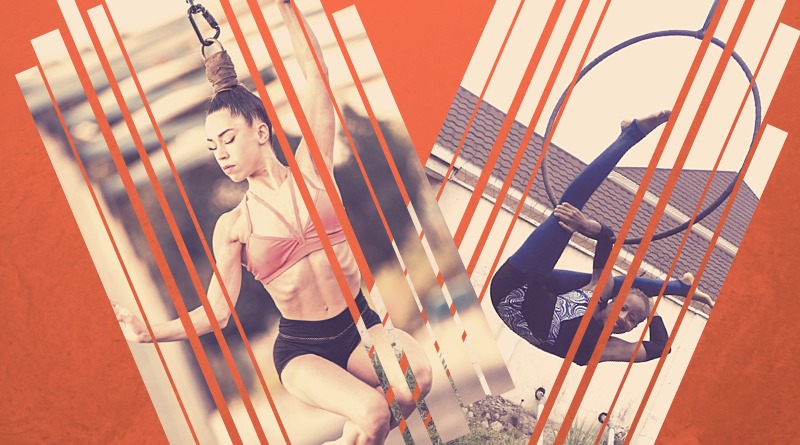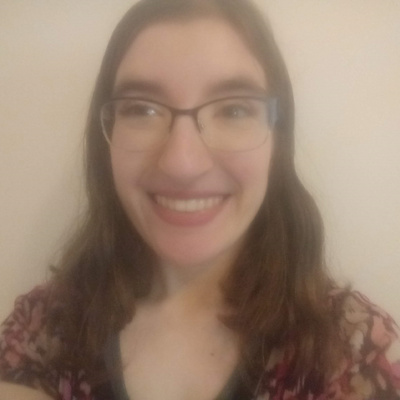Celebrating Women in Circus: Ekpoawan Edem and Elena Suárez Pariente

Our celebration of Women’s History Month continues with two circus history makers in the making: Nigerian hoops artist Ekpoawan Edem and Spanish hair-hang artist Elena Sudrez Pariente. Answering our questions, the two weigh in on what it is to be a woman in the global circus industry— and how female performers can lift each other up.
The journey through circus can be a bit like walking on a highwire. In many parts of the world, female circus artists often make this walk without a safety net… but even so, they keep their eyes ahead and brave the obstacles along the way. Helping them find and keep their balance is their family and friends, and other women, there to catch them if they fall. On two different continents, Ekpoawan Edem and Elena Sudrez Pariente have both found their way across that highwire and helped others do it, too. Now they’re reflecting on how they got there, people who inspired them, and how women can help each other navigate the way across.
Without further ado, let’s hear from them both.

I am a circus artist specializing in hula hoop and aerial hoop. I also do juggling and acro. I started Patatrak Circus company in Nigeria in 2017, and we introduced circus shows and classes into Abuja. I have introduced circus to a region that barely knew what circus was. I believe that God has a purpose for everyone, and finding joy and success in life depends on identifying and carrying out that purpose. I am glad to say I have found my joy.
.

I’m a hair-hanging artist, dancer, and actress. I was the original ballerina in Cirque du Soleil’s Volta, performing the duo of ballet and BMX Flatland; and currently, I’m performing a solo hair hanging act in the show Opium by Spiegelworld in Las Vegas. I started acting when I was 3 years old on TV shows and in movies. I always combined dance and acting, and later, when I was at Cirque du Soleil, I fell in love with the circus world and aerial skills. I found what suits me better: Hair Hanging. It gives me the chance to dance in another way and to bring my dance skills to the air. I love to research movement and the possibilities of what I can do with my body, combining all my ballet experience with hair hanging to bring new movements and refresh this beautiful and powerful skill. In addition to my artistic career, I’m also a journalist and a barre trainer.
What does it mean to you to be a woman in the circus industry?
ELENA: I feel that being a woman in the circus industry is very powerful. Being part of this industry inspires me every day, when I see the strength and beauty of other women, pushing the limits, defying the canons that society tries to impose on us. We are capable of anything with enough perseverance, patience, and passion, and it makes me feel very empowered to be on stage defending my vision— something I believed in so much and put all my heart into. Going from dance to circus, I found a very supportive community with many badass women— on stage and behind the stage— confident that there is a space for everyone, and who know that all of us have something different and special that makes us shine in our unique way. And that’s something I love from this industry: the open mind and support between us all. I love seeing fierce women, with vision and ambition, lead creative projects. We need more of that.
EKPOAWAN: I have never taken statistics, but at a guess, I would say that over 90% of practicing circus artists from Nigeria and other parts of Africa are men. It is not arbitrary. There are many factors, especially social and financial, that don’t allow girls to flourish in the circus in this region. At one point, with my company, I was training a teenage girl for free, and she was performing with us. Suddenly her stepfather decided he wanted me to pay him money, or he would not allow her to continue. Of course, I would not let myself be blackmailed, so that was the end of her training with me since she was a minor. I am extremely fortunate to have a family that does not limit me because I am a woman, and that supports my circus dreams. Other women also inspire me, like Alondra Bueno, my fabulous, fabulous friend whom I have always looked up to; Christine Villafuerte, my first and only hula hoop teacher; Lexi Powell, and Tirsit A Dersuu.
What circus women inspire you?
ELENA: It’s so beautiful to realize that the women I admire are around me, very close. They are my friends, and I love to see them shine; they inspire me so much. They are strong, beautiful, and ambitious women with a fierce attitude whenever there are obstacles, and a kind heart. They are supportive, hard workers— they don’t turn off each other’s lights to shine brighter themselves. They are not scared of the greatness of other women; instead, they are there to make each other even greater, to make you feel that you can achieve your dreams. They clap for you when you get it, and they also have a kind word for you when the industry is tough. That’s the kind of woman I’d like to be, too. I can mention some of them, but there are many women I admire: Marion Crampe, Gasya Atherton, Alanna Bélanger, Marie-Lee Guilber, Leah Moyer, Stacy Clark, Anna Ivaseva, Angela Kim, Charlotte O’ Sullivan, Vanessa Calado, Krista Monson, and Sam Sendel.
What advice would you give to other women and girls who look up to you and want to pursue a similar circus career path like yours?
EKPOAWAN: Yes: do it. Commit 100% to training and developing as an artist, finding other people with similar goals, and sticking to it when it is difficult. Don’t be afraid of looking foolish; it is part of the learning process. I know that money is a big obstacle for a lot of people as it was for me— training and equipment are not cheap, and the time you use to train could be used for a job that pays money. That is why the people who have succeeded in circus need to help those who are just beginning their journey. And people who are starting out need to ask for help when they struggle. I would not have reached where I am now without a great deal of help.

Editor's Note: At StageLync, an international platform for the performing arts, we celebrate the diversity of our writers' backgrounds. We recognize and support their choice to use either American or British English in their articles, respecting their individual preferences and origins. This policy allows us to embrace a wide range of linguistic expressions, enriching our content and reflecting the global nature of our community.
🎧 Join us on the StageLync Podcast for inspiring stories from the world of performing arts! Tune in to hear from the creative minds who bring magic to life, both onstage and behind the scenes. 🎙️ 👉 Listen now!



